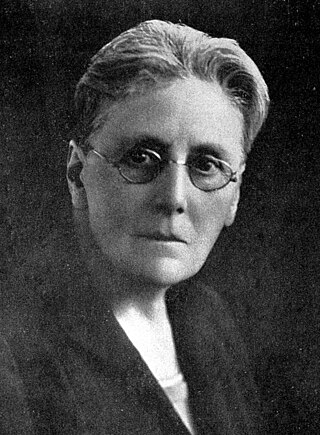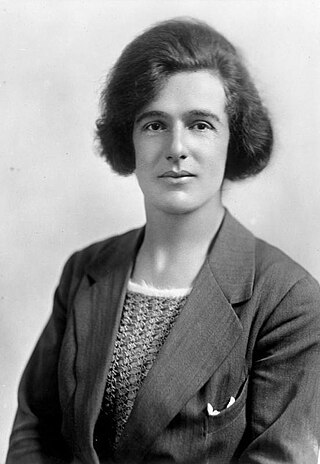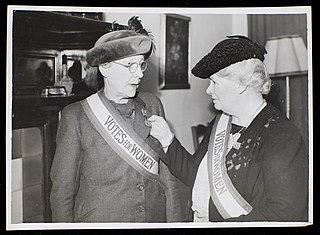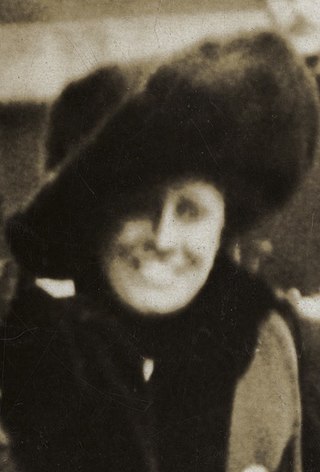
Selina Jane Cooper (née Coombe; 4 December 1864 – 11 November 1946) [1] was an English suffragist and the first woman to represent the Independent Labour Party (ILP) in 1901 when she was elected as a Poor Law Guardian. [2] [3]

Selina Jane Cooper (née Coombe; 4 December 1864 – 11 November 1946) [1] was an English suffragist and the first woman to represent the Independent Labour Party (ILP) in 1901 when she was elected as a Poor Law Guardian. [2] [3]
Selina Cooper was born Selina Coombe in Callington, Cornwall, in 1864, the sixth of seven surviving children of Charles Coombe, railway labourer (and later railway subcontractor) and Jane Coombe (née Uren), dressmaker. She moved to Barnoldswick when she was a child, after her father died of typhoid in 1876. In the same year, aged 12, she began working in the local textile mills at Barnoldswick. She left school at the age of thirteen and started work full-time in the mills. [2] [1]

Cooper became active in trade union activities and took practical courses in laundry, hygiene and first aid and became a member of the Barnoldswick St John's Ambulance Committee in 1895. [3] She was an early member of the Nelson Social Democratic Federation (SDF), and later founded a branch of the party in Brierfield. [4] She joined the Women's Co-operative Guild in 1897 and the North of England Society for Women's Suffrage in 1900. [2] [3]
In 1901, Cooper was elected to the Board of Guardians, as a joint SDF-ILP candidate. She became frustrated with the SDF's lack of interest in the suffrage movement, and moved away from the party, becoming a full-time organiser for the suffrage movement. [4] In 1910 she was chosen to be one of four women to present the case for women's suffrage to H. H. Asquith, the then Prime Minister. [2] In the provinces she with Ada Nield Chew and Margaret Aldersley were experienced labour activists in Lancashire. [5] During the First World War Cooper developed the first ever Maternity Centre in Nelson, Lancashire. She was later elected to the town council and went on to become a local magistrate. She resigned from the Labour Party in the 1930s due to her belief that the party did not take a strong enough line against fascism. [3]
Selina Cooper's house at 59 St Mary's Street, Nelson is marked with a heritage blue plaque. [6] In 2015, she was the subject of a play by the Function Factory theatre in Nelson titled "Hard-Faced Woman". [7]

Emmeline Pankhurst was a British political activist who organised the British suffragette movement and helped women to win in 1918 the right to vote in Great Britain and Ireland. In 1999, Time named her as one of the 100 Most Important People of the 20th Century, stating that "she shaped an idea of objects for our time" and "shook society into a new pattern from which there could be no going back". She was widely criticised for her militant tactics, and historians disagree about their effectiveness, but her work is recognised as a crucial element in achieving women's suffrage in the United Kingdom.

Lydia Ernestine Becker was a leader in the early British suffrage movement, as well as an amateur scientist with interests in biology and astronomy. She established Manchester as a centre for the suffrage movement and with Richard Pankhurst she arranged for the first woman to vote in a British election and a court case was unsuccessfully brought to exploit the precedent. Becker is also remembered for founding and publishing the Women's Suffrage Journal between 1870 and 1890.

Ethel Bentham, was a progressive medical doctor, a politician and a suffragist in the United Kingdom. She was born in London, educated at Alexandra School and College in Dublin, the London School of Medicine for Women and the Rotunda Hospital.

Ada Nield Chew was a campaigning socialist and a British suffragist. Her name is on the plinth of Millicent Fawcett's statue in Parliament Square, London.

Jill Liddington is a British writer and academic who specialises in women's history.

Jessie Stephen, MBE was a twentieth-century British suffragette, labour activist and local councillor. She grew up in Scotland and won a scholarship to train as a teacher. Family finances dictated otherwise, leading to her becoming a domestic worker at the age of 15. She became involved in national labour issues as a teenager, via organisations such as the Independent Labour Party and the Women's Social and Political Union. Stephen moved to London during World War I and in the 1920s she toured the United States and Canada, where she held meetings with the public including migrant English domestic workers.
Marion Coates Hansen was an English feminist and women's suffrage campaigner, an early member of the militant Women's Social and Political Union (WSPU) and a founder member of the Women's Freedom League (WFL) in 1907. She is generally credited with having influenced George Lansbury, the Labour politician and future party leader, to take up the cause of votes for women when she acted as his agent in the general election campaign of 1906. Lansbury became one of the strongest advocates for the women's cause in the pre-1914 era.

Helen Crawfurd was a Scottish suffragette, rent strike organiser, Communist activist and politician. Born in Glasgow, she was brought up there and in London.

Thorley Smith was Britain's first Parliamentary candidate to stand on a platform of women's suffrage. He stood in the 1906 general election in Wigan, Lancashire. He lost to the Conservative candidate, but polled more votes than the Liberal.

The Women's Peace Crusade was a grassroots socialist movement that spread across Great Britain between 1916 and 1918. Its central aim was to spread a 'people's peace', which was defined as a negotiated end to the First World War without any annexations or indemnities. The movement was first established in Glasgow in July 1916, and officially launched on 10 June 1917. It later spread across Great Britain, with demonstrations taking place in Leeds, Bradford, Leicester, Birmingham and Lancashire. Although it gathered a substantial following, the Women's Peace Crusade faced opposition from both the government and police, with members being arrested and reportedly threatened.

Sarah Reddish was a British trade unionist and suffragette, who was active in the co-operative movement. A supporter of women running for local elections as a springboard to gaining national voting rights, she ran for office on the Bolton School Board and was successful in her second attempt in 1899. She also ran for office as a Poor Law Guardian, and was successful, but was defeated in her attempt to become a member of the borough council. As a textile worker, Reddish knew first-hand the conditions and wages women experienced and joined unions, working as a paid organiser to help women improve their situations. She was both a socialist and a radical feminist, urging women's equality in the public sphere.

Emma Sproson, was a suffragette, then a suffragist, socialist, politician and women's rights activist. Active in the Midlands and from a working class background, she became Wolverhampton's first female councillor, gaining the nickname "Red Emma" in the process.

Annot Robinson, nicknamed Annie, was a Scottish suffragette and pacifist. She was sentenced to six months for trying to break in to the House of Commons. She helped to found the Women’s International League for Peace and Freedom.

Margaret Hills was a British teacher, suffragist organiser, feminist and socialist. She was the first female councillor on Stroud Urban District Council and later served as a Councillor on Gloucestershire County Council.

Hannah Winbolt (1851–1928) was a prominent advocate for women's suffrage, giving speeches across the United Kingdom on the subject of women's rights from her perspective of a working woman. Known for being an effective orator, she was one of four women honoured retrospectively by Stockport Metropolitan Borough Council, in the naming of Suffragette Square, Stockport.
Henry Brockhouse was a British socialist politician.
Alice Morrissey was a British Catholic, socialist leader and suffragette activist from Liverpool, who was imprisoned in the campaign for women's right to vote.
Margaret Aldersley (1852–1940) was a British suffragist, feminist and trade unionist.

Helen Fairhurst was initially a textile worker who became a trade unionist, suffragette and president of the Wigan and District Weavers, Winders, Reelers and Beamers Association, a virtually all-women trade union. She fought to introduce suffrage amendments to the TUC and campaigned for the NUWSS. She was part of a group of female campaigners known as "radical suffragists" which also included Sarah Reddish, Ada Nield Chew and Selina Cooper.
Harriette Mary Beanland was a British textile worker and suffragette who was secretary to the Women's Labour League branch in Nelson in Lancashire.